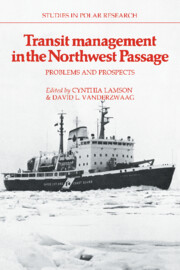Book contents
- Frontmatter
- Contents
- List of figures
- Acknowledgments
- PART I PERSPECTIVES ON THE PROBLEM
- 1 The Northwest Passage: a contrast of visions
- Post scriptum
- 2 The environment of the Northwest Passage
- 3 The development of Northern ocean industries
- 4 Arctic marine transport and ancillary technologies
- 5 Canadian arctic marine transportation: present status and future requirements
- 6 Northern decision making: a drifting net in a restless sea
- 7 Constitutional development in the Northwest Territories
- PART II PARADIGMS AND PROSPECTS
- APPENDIX: Statement on Canadian sovereignty
- CONTRIBUTORS
Post scriptum
Published online by Cambridge University Press: 26 March 2010
- Frontmatter
- Contents
- List of figures
- Acknowledgments
- PART I PERSPECTIVES ON THE PROBLEM
- 1 The Northwest Passage: a contrast of visions
- Post scriptum
- 2 The environment of the Northwest Passage
- 3 The development of Northern ocean industries
- 4 Arctic marine transport and ancillary technologies
- 5 Canadian arctic marine transportation: present status and future requirements
- 6 Northern decision making: a drifting net in a restless sea
- 7 Constitutional development in the Northwest Territories
- PART II PARADIGMS AND PROSPECTS
- APPENDIX: Statement on Canadian sovereignty
- CONTRIBUTORS
Summary
“Time waits for no man.” In the field of academic research the saying should be modified to “Time waits for no book”, for human events often march quickly beyond the facts captured by any manuscript.
In the fast-changing world of Arctic affairs with the rapid evolutions in technologies, legal regimes and political arrangements, the saying is particularly true and certainly applies to the present volume. When the manuscript was in preparation during the years 1982–1984, two of Canada's Arctic policies were particularly unclear – the extent of national jurisdiction over Arctic waters and a national commitment to expand icebreaking capabilities. However, on September 10, 1985, External Affairs Minister, Joe Clark, reacting to public sentiment aroused by the transit of the U.S. Coast Guard icebreaker Polar Sea through the Northwest Passage in August 1985, clarified the political waters by announcing in the House of Commons the drawing of straight baselines around Canada's Arctic Archipelago, in order to formalize Canadian sovereignty over the enclosed waters, and the intention to construct a Polar Class 8 icebreaker.
Because the statement demonstrated a new national commitment to develop and control Northern waters, the statement is reproduced in its entirety as an Appendix. The statement challenges Canadians to address questions about transit management including the designation and protection of environmentally significant areas, formulation of a sound Northern economic strategy, development of appropriate marine technologies, implementation of mandatory vessel management services traffic, and creation of an explicit and fair decision-making process for reviewing industrial proposals having a shipping component.
- Type
- Chapter
- Information
- Transit Management in the Northwest PassageProblems and Prospects, pp. 7Publisher: Cambridge University PressPrint publication year: 1988
- 1
- Cited by



